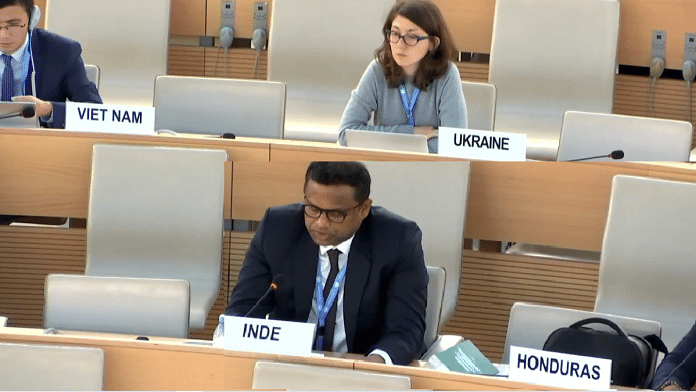New Delhi: India has urged Ottawa to stop the “misuse” of freedom of expression to incite violence and to prevent activities of extremist groups in the country, during Canada’s Universal Periodic Review (UPR) at the United Nations Human Rights Council (UNHRC).
India’s remarks come in the backdrop of lingering diplomatic tensions between the two countries following Canadian Prime Minister Justin Trudeau’s allegations in September of a “potential link” between agents of the government of India and the killing of Sikh extremist Hardeep Singh Nijjar in Canada earlier in the year.
The UPR is a process within the UNHRC, where member countries undergo a peer review of their human rights records every four-and-a-half years. Established in March 2006, the first periodic review took place in 2008, and since then all 193 UN member states have been reviewed three times.
Speaking at the fourth such review for Canada at the UNHRC Friday, Indian diplomat Mohammed Hussain made three recommendations “in the spirit of constructive dialogue”.
“One, further strengthen the domestic framework to prevent misuse of freedom of expression for inciting violence and disallow activities of groups which are promoting extremism,” said Hussain, referring to New Delhi’s growing concerns over growing Sikh separatist sentiment in Canada.
He then asserted that Canada must “strengthen legislative and other measures” to “effectively prevent attacks on places of worship of religious and racial minorities” and “address hate crimes and hate speech”.
Furthermore, Hussain sought to “put an end to structural discrimination against children belonging to indigenous groups. And address disparities in access to services by all children.”
According to the UN website, Canada has previously been reviewed in February 2009, April 2013, and May 2018, while India has been reviewed in April 2008, May 2012, May 2017 and 10 November 2022.
In its fourth evaluation, Canada was evaluated by the UPR working group, consisting of all 47 UNHRC members. Ottawa was among the 14 members to be reviewed in the current session.
Also Read: At 2+2 dialogue with US, India makes concerns on Sikh extremism, Pannun’s threats ‘very clear’
India-Canada row
Tensions between India and Canada have been escalating since 18 September, when Canadian Prime Minister Justin Trudeau linked India with Nijjar’s killing in British Columbia in June this year. New Delhi had rejected the allegations, calling them “absurd and motivated”.
The diplomatic row escalated between the countries as both expelled each other’s diplomats.
Canada withdrew 41 diplomats and 42 dependents last month alleging that New Delhi’s request for diplomatic parity was a “violation of international law and the Vienna Convention”. This came after New Delhi repeatedly sought diplomatic parity with rising tensions between the two countries, giving Ottawa a deadline of 10 October, which was later extended to 20 October.
The US and UK had backed Canada’s allegations, with the US noting that it was “concerned by the departure of Canadian diplomats”. New Delhi rejected these allegations, stating that its actions were “fully consistent with Article 11.1 of the Vienna Convention”.
India has resumed some visa services to Canada and even backed a Canada-proposed resolution in the United Nations General Assembly last month, supporting the condemnation of militant group Hamas’s 7 October attacks in Israel.
In his latest comments on differences with India Sunday, however, Trudeau yet again accused India of “arbitrarily” kicking out 41 diplomats and violating international law. This came after New Delhi revealed that it had communicated its concerns over the Sikh separatism issue in Canada to Washington during the India-US 2+2 ministerial dialogue held Friday.
So far, Trudeau has been careful to use the word “allegation” rather than “evidence” while linking India to Nijjar’s killing.
In an interview to Canadian publication The Globe and Mail earlier this month, High Commissioner of India to Canada Sanjay Kumar Verma had challenged Ottawa to “show evidence” to support its allegations in the Nijjar case.
“There is no specific or relevant information provided in this case for us to assist them in the investigation,” Verma said.
(Edited by Richa Mishra)
Also Read: Canadian diplomatic strength is three times that of India’s, besides an extra Mission



